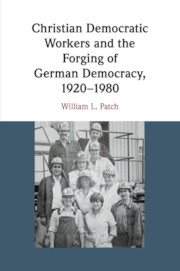Refine search
Actions for selected content:
26946 results in Economic history
6 - The Political Success and Organizational Decline of Christian Democratic Workers, 1966–1980
-
- Book:
- Christian Democratic Workers and the Forging of German Democracy, 1920–1980
- Published online:
- 09 March 2018
- Print publication:
- 15 March 2018, pp 253-300
-
- Chapter
- Export citation
Copyright page
-
- Book:
- Christian Democratic Workers and the Forging of German Democracy, 1920–1980
- Published online:
- 09 March 2018
- Print publication:
- 15 March 2018, pp iv-iv
-
- Chapter
- Export citation
Abbreviations
-
- Book:
- Christian Democratic Workers and the Forging of German Democracy, 1920–1980
- Published online:
- 09 March 2018
- Print publication:
- 15 March 2018, pp viii-x
-
- Chapter
- Export citation
Conclusion: The Legacy of the Christian Labor Movement
-
- Book:
- Christian Democratic Workers and the Forging of German Democracy, 1920–1980
- Published online:
- 09 March 2018
- Print publication:
- 15 March 2018, pp 301-308
-
- Chapter
- Export citation
4 - The Influence of Christian Democratic Workers on Welfare Legislation, 1953–1957
-
- Book:
- Christian Democratic Workers and the Forging of German Democracy, 1920–1980
- Published online:
- 09 March 2018
- Print publication:
- 15 March 2018, pp 153-196
-
- Chapter
- Export citation
IBM's Tiny Peripheral: Finland and the Tensions of Transnationality
-
- Journal:
- Business History Review / Volume 92 / Issue 1 / Spring 2018
- Published online by Cambridge University Press:
- 13 March 2018, pp. 3-28
- Print publication:
- Spring 2018
-
- Article
- Export citation

Christian Democratic Workers and the Forging of German Democracy, 1920–1980
-
- Published online:
- 09 March 2018
- Print publication:
- 15 March 2018
The origins of Swiss wealth management? Genevan private banking, 1800–1840
-
- Journal:
- Financial History Review / Volume 25 / Issue 2 / August 2018
- Published online by Cambridge University Press:
- 04 March 2018, pp. 161-182
-
- Article
- Export citation
Figures
-
- Book:
- The Economic Consequences of the War
- Published online:
- 02 February 2018
- Print publication:
- 22 February 2018, pp xi-xii
-
- Chapter
- Export citation
4 - Made in Germany: The Post-War Export Boom
-
- Book:
- The Economic Consequences of the War
- Published online:
- 02 February 2018
- Print publication:
- 22 February 2018, pp 129-172
-
- Chapter
- Export citation
Bibliography
-
- Book:
- The Economic Consequences of the War
- Published online:
- 02 February 2018
- Print publication:
- 22 February 2018, pp 241-266
-
- Chapter
- Export citation
Index
-
- Book:
- The Economic Consequences of the War
- Published online:
- 02 February 2018
- Print publication:
- 22 February 2018, pp 267-272
-
- Chapter
- Export citation
Contents
-
- Book:
- The Economic Consequences of the War
- Published online:
- 02 February 2018
- Print publication:
- 22 February 2018, pp ix-x
-
- Chapter
- Export citation
3 - Growth Accounts for West German Industry
-
- Book:
- The Economic Consequences of the War
- Published online:
- 02 February 2018
- Print publication:
- 22 February 2018, pp 87-128
-
- Chapter
- Export citation
5 - Managing the Miracle: Economic Policy
-
- Book:
- The Economic Consequences of the War
- Published online:
- 02 February 2018
- Print publication:
- 22 February 2018, pp 173-218
-
- Chapter
- Export citation
2 - The Economic Geography of Post-War Dislocation
-
- Book:
- The Economic Consequences of the War
- Published online:
- 02 February 2018
- Print publication:
- 22 February 2018, pp 52-86
-
- Chapter
- Export citation
Conclusions
-
- Book:
- The Economic Consequences of the War
- Published online:
- 02 February 2018
- Print publication:
- 22 February 2018, pp 219-226
-
- Chapter
- Export citation
1 - The Audit of Defeat: Initial Conditions
-
- Book:
- The Economic Consequences of the War
- Published online:
- 02 February 2018
- Print publication:
- 22 February 2018, pp 19-51
-
- Chapter
- Export citation
Copyright page
-
- Book:
- The Economic Consequences of the War
- Published online:
- 02 February 2018
- Print publication:
- 22 February 2018, pp vi-vi
-
- Chapter
- Export citation
Introduction
-
- Book:
- The Economic Consequences of the War
- Published online:
- 02 February 2018
- Print publication:
- 22 February 2018, pp 1-18
-
- Chapter
- Export citation
